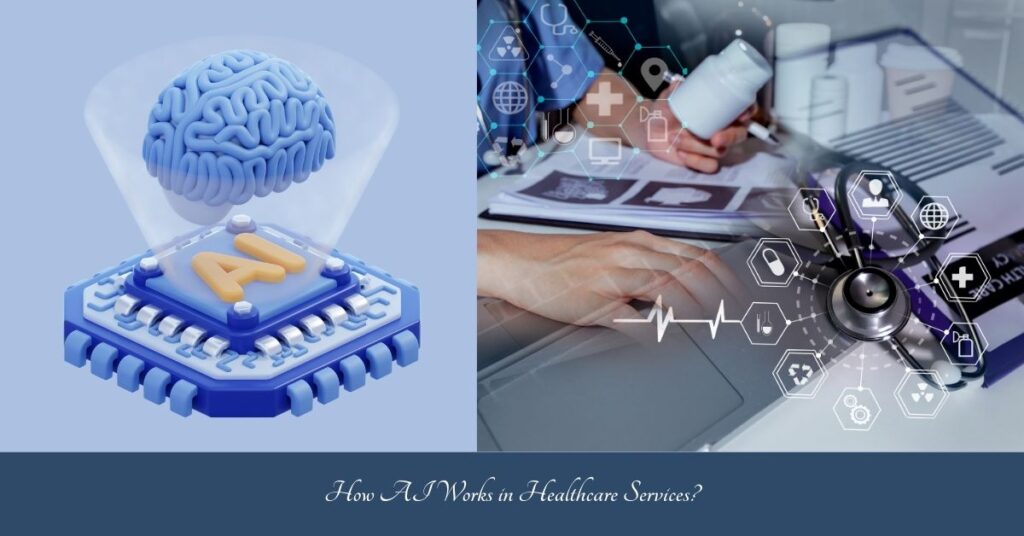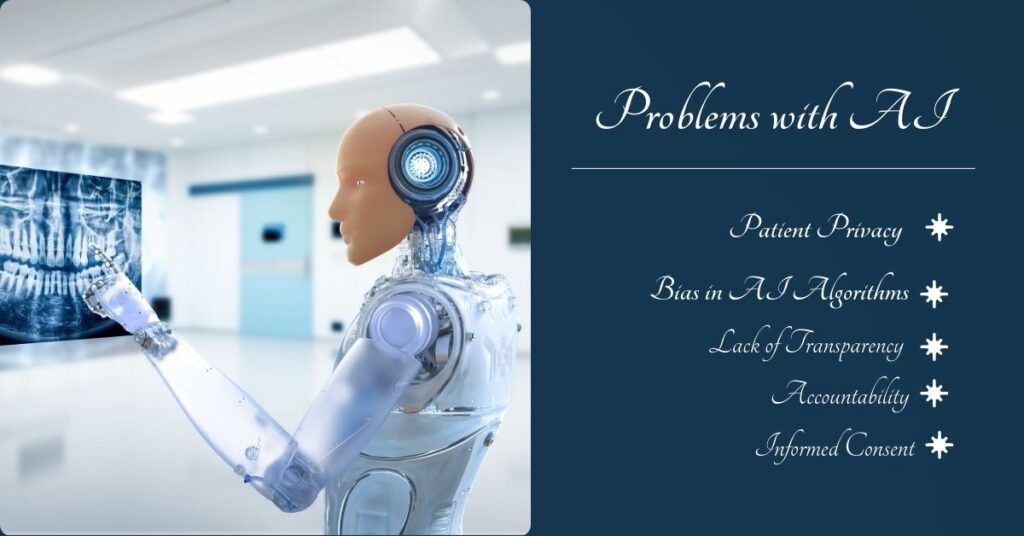Problems with AI in Healthcare present significant challenges, including issues with privacy, bias, accountability, and accessibility that need to be addressed for ethical and effective implementation
The healthcare industry is undergoing a technological transformation, and one of the driving forces behind this change is artificial intelligence (AI).
From diagnosing diseases to personalizing treatment plans, AI has the potential to revolutionize healthcare. However, as AI becomes more integrated into medical practices, several ethical problems are emerging.
In 2025, these problems are becoming more pronounced, and healthcare providers, patients, and policymakers must address them.
In this blog post, we’ll explore the major ethical problems with AI in healthcare and how they may impact the future of medical care.
How AI Works in Healthcare Services?

Problems with AI in Healthcare are transforming how services are delivered by enhancing diagnosis, treatment, and patient care. Through machine learning algorithms, AI analyzes vast amounts of medical data, enabling more accurate diagnoses and personalized treatment plans.
AI-powered tools, like predictive analytics, help identify disease patterns and potential health risks early, improving patient outcomes.
In imaging, AI algorithms assist radiologists in detecting anomalies in X-rays and MRIs more efficiently. Virtual health assistants powered by AI offer 24/7 support, answering patient inquiries and managing appointments.
Additionally, AI aids in drug discovery by simulating molecular interactions and predicting the success of new drugs. Ultimately, AI is enhancing efficiency, reducing errors, and making healthcare more accessible and affordable.
Before exploring Major Ethical Problems with AI in Healthcare 2025, check out our previous one on Diamond Microdermabrasion: a transformative treatment for smoother, brighter, and more youthful skin.
Key Problems with AI in Healthcare
AI in healthcare presents several problems, including a lack of transparency, bias in decision-making, data privacy concerns, and accountability for errors. Addressing these issues is crucial for ensuring the ethical and effective integration of AI in patient care.
Let’s explore the major ethical issues surrounding AI in healthcare that healthcare providers, patients, and tech developers are currently facing.

Patient Privacy and Data Security
AI systems depend heavily on patient data to function. That means enormous amounts of sensitive information are collected, stored, and analyzed. While encryption and security measures have improved, data breaches still happen, and the consequences are severe.
Patients deserve to trust that their private medical information won’t be exposed, misused, or sold. When AI companies or hospitals fail to protect data, they risk not only lawsuits but also permanent damage to patient trust.
Key Concern: How do we ensure that patient data stays private when it is needed to train and improve AI systems?
Bias in AI Algorithms
AI is only as unbiased as the data it’s trained on. If the training data has gaps, such as underrepresenting certain ethnicities, genders, or age groups, the AI can make biased decisions.
For example, an AI might be excellent at diagnosing skin cancer on lighter skin tones but much less accurate on darker skin tones. This can lead to misdiagnosis and worsen health disparities among minority populations.
Key Concern: Are AI tools fair and effective for everyone, not just a select group?
Lack of Transparency (“Black Box” Problem)
Many AI systems operate like a “black box,” meaning they make decisions in ways even their creators don’t fully understand. In healthcare, this is dangerous.
Imagine a patient being denied a life-saving surgery because “the AI said so,” but no one can explain why. Both patients and doctors deserve transparency when it comes to decisions that affect people’s lives.
Key Concern: Can we trust a decision if we don’t understand how it was made?
Accountability: Who’s to Blame?
When an AI system makes a mistake, say, misdiagnosing a patient, who is responsible? The doctor? The hospital? The software developer? Or the AI itself?
Without clear lines of accountability, patients may struggle to seek justice when errors happen. And doctors may become overly reliant on AI, trusting machines more than their training.
Key Concern: In a life-and-death industry like healthcare, we need to know who is responsible for mistakes.
Informed Consent
Patients must consent to treatments, but what about when AI is involved? In many cases, patients don’t even realize AI tools are being used to make decisions about their care.
For true informed consent, patients should be made aware when AI is influencing their diagnosis or treatment, and they should have the option to opt out.
Key Concern: Are patients fully informed about the role AI plays in their healthcare decisions?
Overdependence on Technology
Doctors today use AI to assist with tasks like analyzing X-rays or predicting patient risks. While helpful, there’s a danger: healthcare providers may become overly reliant on AI and stop questioning its suggestions.
Critical thinking is crucial in medicine. AI should support doctors, not replace their judgment.
Key Concern: How do we make sure human expertise stays at the center of healthcare?
Access and Inequality
Cutting-edge AI tools are expensive to develop and maintain. That means only well-funded hospitals and private clinics may have access to the best AI technologies.
This deepens the healthcare divide between rich and poor, urban and rural, insured and uninsured.
Key Concern: Will AI-driven healthcare worsen inequality rather than reduce it?
How AI Applications are Revolutionizing Healthcare?

AI applications are revolutionizing healthcare by enhancing diagnostics, treatment plans, and patient care. AI algorithms can analyze medical images, detect early signs of diseases like cancer, and predict patient outcomes with high accuracy.
In personalized medicine, AI helps tailor treatments based on individual genetics, improving effectiveness. Virtual health assistants and chatbots provide 24/7 support, offering advice and monitoring patient progress.
AI is also streamlining administrative tasks, reducing paperwork, and improving workflow efficiency in hospitals. With predictive analytics, AI can forecast patient admissions and optimize resource allocation.
Overall, AI is improving healthcare quality, accessibility, and efficiency, empowering both providers and patients for better outcomes.
How to help Diamond Aesthetics in resolving ethical issues with AI in healthcare?
To help Diamond Aesthetics resolve ethical issues with AI in healthcare, start by ensuring transparency in how AI tools are used, especially in patient consultations or diagnostics.
Educate staff and patients about AI’s role to build trust. Ensure AI decisions are always reviewed by qualified professionals to avoid errors.
Protect patient data by using secure systems and following privacy laws strictly. Lastly, create clear policies on AI use and regularly review them to stay updated with ethical standards.
By combining technology with human care and responsibility, Diamond Aesthetics can offer safe, ethical, and effective services that clients can trust.
FAQs About AI Ethics in Healthcare
What are the problems with AI in healthcare?
AI in healthcare raises concerns about data privacy, algorithmic bias, lack of transparency, and over-reliance on automated decisions that may lack human judgment and empathy.
How is AI biased in healthcare?
AI can be biased if trained on unbalanced data, leading to unequal treatment across gender, race, or socioeconomic groups, potentially worsening existing healthcare disparities.
Can we trust AI in healthcare?
Trust in AI depends on transparency, clinical validation, and ethical oversight. While AI can assist doctors, blind reliance without human review can harm outcomes.
What is a potential vulnerability associated with AI algorithms in healthcare decision-making?
A key vulnerability is the “black-box” nature of many AI systems, where decisions lack explainability, making it hard for healthcare providers to justify or understand the output.
Can patients refuse AI-assisted healthcare?
In many places, yes. Patients have the right to be informed about AI involvement and should be given alternative options if they are uncomfortable.
Will AI replace doctors completely in the future?
Unlikely. AI is a powerful tool, but human judgment, empathy, and experience remain irreplaceable in healthcare.
What steps are being taken to make AI more transparent?
Researchers and regulators are pushing for “explainable AI,” which aims to make AI decisions understandable to humans, particularly in critical fields like healthcare.
What is the biggest technology challenge facing healthcare today?
The biggest challenge is integrating advanced AI technologies without compromising patient privacy, safety, or ethical standards of care.
Final Thoughts
The problems with AI in healthcare are not just technical challenges, but ethical dilemmas that require careful consideration. While AI can revolutionize patient care, it’s essential to address concerns such as data privacy, algorithmic bias, accountability, and equitable access.
By tackling these issues head-on, we can ensure that AI remains a valuable tool in healthcare without compromising patient trust or fairness. The future of healthcare depends on balancing innovation with responsibility, ensuring that technology works for everyone, not just a select few.
AI is transforming healthcare in 2025, offering new hope and powerful tools for diagnosis and treatment. At Diamond Aesthetics, we believe in embracing technology, but only when it improves patient care, maintains trust, and upholds ethical standards.
The future of healthcare is bright with AI, but only if we proceed with caution, responsibility, and humanity at the forefront.




